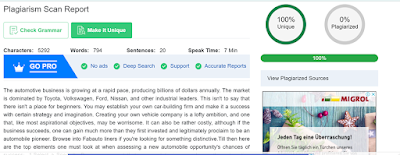The automotive business is growing at a rapid pace, producing billions of dollars annually. The market is dominated by Toyota, Volkswagen, Ford, Nissan, and other industry leaders. This isn't to say that there isn't a place for beginners. You may establish your car-building firm and make it a success with a certain strategy and imagination.
Creating your own vehicle company is a lofty ambition and one that, like most aspirational objectives, may be worrisome. It can also be rather costly, although if the business succeeds, one can gain much more than they first invested and legitimately proclaim to be an automobile pioneer.
Browse into Fabauto liners if you're looking for something distinctive. Till then here are the top elements one must look at when assessing a new automobile opportunity's chances of success.
1. Select A Specialty
Design a concept that can revolutionize or enhance the automotive sector. Introducing more of the "usual stuff" to any sector will not be sustainable. Determine a need in the automobile sector that your new business may address.
Determine the potential consumers and their price levels, the technologies the automobile will employ and how much it pertains to its suggested price bracket, how this will comply with existing environmental standards requirements, and how it would be built to expand your vision as far as you can.
So, first and foremost, pick what sorts of cars you want to develop. Electric and green car sales are on the rise all around the world. You'll need a sample to convince investors why they must invest in your startup before you can get funds.
Recruit designers that already have worked in the automobile industry to generate a functional design, then have a model manufactured in a manufacturing facility, either nationally or overseas.
Take into account that a prototype may not be the same as a finished product that reaches customers, but it will help funders and manufacturers understand your vision for the ultimate product.
2. Establish A Powerful Business Strategy
It takes real effort and capital to start an automotive corporation. Plan to employ top staff, negotiate with vendors, and approach financiers. Create a business strategy and follow this as a guide to progress. It should provide an outline of one's company as well as its objective, an overall strategy, market research, revenue projections, and legal implications.
Ensure your strategy includes all aspects of beginning and operating a company of this nature. Determine your consumer profile, research your competition, and be explicit about the automobiles you'll offer. Look for wholesale car parts vendors and get many estimates from them using valid platforms and browsing them on various media platforms..
3. Securing Business Financing
One can't establish a vehicle firm if you don't have enough capital. You'll need to get capital unless you're ready to initiate the firm with your resources. Government funds may be available based on the technology you're deploying and the sort of business you're starting.
Angel investors, Kickstarter projects, and collaborations with established large businesses are some possibilities that you might employ instead of or in addition to funding.
You may begin obtaining everything you'll need for your startup company, such as commercial space, a qualified team, and a production facility, once you've acquired investment.
4. Obey The Guidelines
Following the registration of your firm and the issuance of a reference number, you will be required to apply for several licenses and permissions. To learn further about licensing requirements, contact the Department of Motor Vehicles or go to the DMV webpage.
Remember to include a sketch of both the manufactured product, and a photograph of your company website, an application for an occupational license, a directory of distributors, and other papers, among others.
The manufacturing and storage will also require licenses and permissions. Development permissions, zoning approvals, permits to build, property authorizations, and specialized state-issued business permits are examples of these.
5. Expand Your Automobile Manufacturing Business
Specify whether you'll sell the cars in a showroom, via retailers, or through major suppliers. Another alternative is to contact prospective customers, display your concept, and take special bookings from them.
Create a company website that emphasizes your product and displays what distinguishes you differently. Join automotive enthusiast-oriented newsgroups, discussion forums, and social media groups. Use these channels to gain a better understanding of your core demographic and to market your business. Visit vehicle events and trade exhibits to meet new clients and make contacts.
Conclusion
It's not the tipping point for your automobile company; it's just the beginning. Visit genuine venues for even more insights. Until then, Consider these stages to be the groundwork you must do until you can begin the hands-on job of creating an automobile firm. However, this is a strategy that may be used to tackle a challenging sector.
You're prepared to start addressing your position in the automobile sector now that you have a functioning prototype, a thorough business strategy, and sufficient money.














